
Barnett Newman. 1970. (unfinished)
“The essence of capitalism is to turn nature into commodities and commodities into capital. The live green earth is transformed into dead gold bricks, with luxury items for the few and toxic slag heaps for the many. The glittering mansion overlooks a vast sprawl of shanty towns, wherein a desperate, demoralized humanity is kept in line with drugs, television, and armed force.”
Michael Parenti
“The suppression of the sexual activity of children and teenagers is the basic mechanism which produces the characterial structures adapted to political, ideological, economic control…The repression of natural sexuality in the child, particularly of the genitality, makes the child apprehensive, timid, obeying, apprehensive in front of the authority, ‘nice’, ‘quiet’; it paralyses its rebellious tendencies, because the rebellion is associated with anguish; by inhibiting the sexual curiosity of the child, it causes a general confusion of its critical sense and of its mental faculties.”
Wilhelm Reich.
“Compliance carries with it a sense of futility for the individual and is associated with the idea that nothing matters and that life is not worth living.”
D.W. Winnicott
“Modern man is drinking and drugging himself out of awareness, or he
spends his time shopping, which is the same thing.”
Ernest Becker
I was watching a TV show the other night. In it, a woman is driving and sees flashing police lights behind her, and the voice of the cop on his PA system, telling her to pull over. She does so. Its a rainy night and the cop takes his time walking up to the car, with his flashlight, shining it into the back seat of her car, and then into her face. She is nervous. Scared. The cop asks for ID. Now…at this point it struck me, not for the first time, how very, very odd it is that police can do this. Can saunter over, looking at your personal belongings, asking pointed questions that convey his suspicions about you, and then demand papers. The idea of carrying papers is a fairly recent development, actually. As are passports. But what struck me was the abusive nature of this relationship. Cops can do anything. And the media and ruling class make sure that there is this irrational adoration of police power. There is an endless litany of thanks for the police, the thin blue line, the men who keep us (well, keep white people) safe from criminals. There is, of course, no reason that anyone should cause you such anxiety, such fear. Nobody should be allowed to come shine a light in your face. The truth is that society could self police itself 90% of the time. There is, MAYBE, maybe, ten percent need for 10% of cops. And even then, these days, I’d rather take my chances with the criminals. But today, airport security, mall guards, even people such as pharmacists will ask invasive questions and tacitly accuse you of something dishonest.

Leonardo Da Vinci, drawing for flying machine.
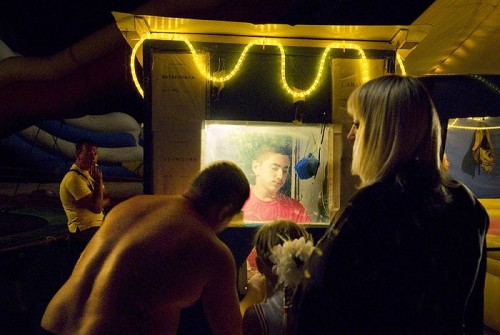
Oksana Yushko, photography.
But back to the woman in the car and the highway patrolman. There is no reason, NONE, zero, for cops to be able to pull you over and interrogate you. In Norway if you speed, cops usually just mail you a notification of a fine. Sometimes they wave you over and write you a citation. But nobody pokes around in your car. Nobody asks to see more than a driver’s license. Police never ever stop and interrogate anyone. One does not fear asking police on the street for directions. Except you rarely see a cop in Norway, as there are very few of them. In the U.S. the population now accepts this purely fascistic police presence. They tolerate an authoritarian social contract that says Cops are all powerful, and all good. And that cops represent some domestic elite and pure Spartan cadre, one imbued with moral purpose, mendicants, whose unique stature grants them special dispensation for excesses, while enacting laws to specially punish those who might hurt such priests of power. One of the strangest legal statutes is that which carves out special and extreme punishment for those who harm any officer of law enforcement. Not to mention that almost never does Hollywood portray anything like systemic corruption or racism or sadism. Another story this week was of prison guards in California arranging gladiator battles between convicts. This is not really news, though. For decades certain prisons in the California Prison System had reps as Gladiator Schools (Corcoran was the primary one). But casual use of big and sadistic cons to implement punishments was routine. The con, a psycho to begin with, and happy to accept a carton of smokes to do what he liked doing anyway, would be used by guards to threaten young inmates. One would see guards openly threaten new inmates by suggesting they bunk with aforementioned psycho con. This is not made into a movie. For there is always, even in the most cynical TV drama, the most edgy, a clear line demarcating the good and the bad. Cops are the side of good, and black teens, latino gangs, and Russians/Serbs/Chinese/Muslims are bad. There are white killers, but they are *crazy*. Black killers are not crazy, they are *bad*. And for all the bad apples corrupt prison guards on TV and in film, the institution is always self adjusting and basically good. I can’t remember ever seeing a TV show in which a character who becomes a cop is questioned by friends or family about this career decision. Nobody says; ” Gee Bobby, why do you want to be one of those psycho racist bullies?*
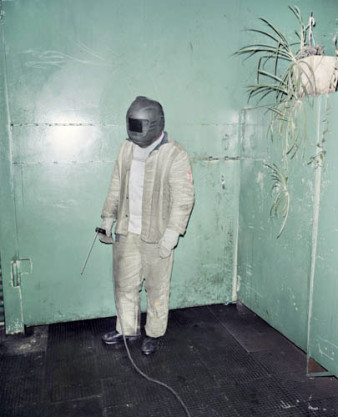
Rafal Milach, photography. “Winner; best welder in Belarus & Russia”.
Capitalism itself is embedded in all this, of course. For the basic relationship of market Capitalism, the division of labor which was historically predicated upon the containing or control of the commons, is etched into the psyche of those living within it. The proletariat was dependent upon those who owns the means of production, and who would pay them. This is all well known and discussed elsewhere (Marx for one) but in the broadest terms, there is a relationship of dependence. This is the core reality of all Capitalist societies. Whatever else, the financier or the factory owner controls the ability to survive for the proletariat. The ownership or proprietor class is therefore the engine of desire in Capitalist systems, and of fear. And today, the shape of desire is molded into the form of money. But what I want to try and discuss here is the basic relationship of hierarchical power that comes along with Capitalism, and how this shapes all narrative.
How has it come about that this highway patrolman can walk over and order you out of your car, or demand you place your hands on the steering wheel, or bark other orders and have this accepted. To not obey would mean arrest and detention, or even death. For the poor all of this more acute, and for black and brown youth even more so. However, for many, so routine have these actions become that they hardly register as open to question. They are experienced, largely, as natural. Very few people object to having some rent-a-cop demand they open their purse or handbag for inspection. Notwithstanding that legally speaking these *security personnel* have no right to demand this. So, in a system where money is the linkage to control, and where desire is inscribed into anything to do with money, and where money is a foundational principle for this desire — the subject has, increasingly it seems, lost the memory of refusal; the memory and the structural dynamic of refusal has atrophied. Another aspect of this, and what I wanted to write about, really, is in a society in which the backdrop is a kind of violence, or potential violence, a backdrop of punishment really, the ordering narratives of people’s lives take on an acute bad faith.
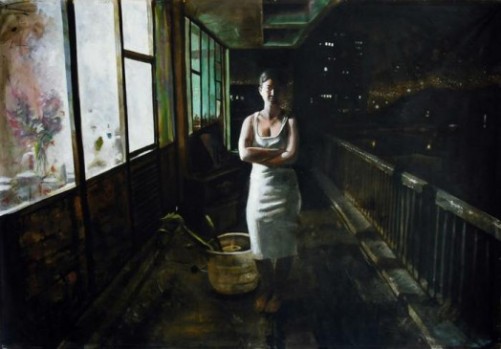
Matthew Hindley
There are several psychic or psychological impulses running through this. One is, I believe, that a perverse comfort is now, for many, in the closing in of space. Both literal space, to some degree, but certainly psychic space, the mimetic space of re-narrating stories as we engage them. Firstly, I suspect fewer people tell stories, hear stories, at least of any complexity, and very many fewer read stories, and that the engagement with story is adumbrated, folded in on itself, in much the same shape as old vestigial forms of resistance have folded in or collapsed. The desire for open narrative is replaced with plot. The easy formulas of Hollywood. But even if artworks that tell expanded stories the allegorical is shrunken and the journey feels as if it never really got started (Bloodline, more on that below). And I feel strongly that this sense of not beginning the journey is connected to the internalizing of something that began with the closing of the commons.
Capitalism is coercive. The daily journey of wage slavery is no journey at all; it is the closing down of much of our psychic antennae. The dullness felt in crowds today is the product of a culture pulling in its claws in a sense. At the same time the psychic economy dictates that compensatory ‘pretend’ claws be approved and encouraged, even.
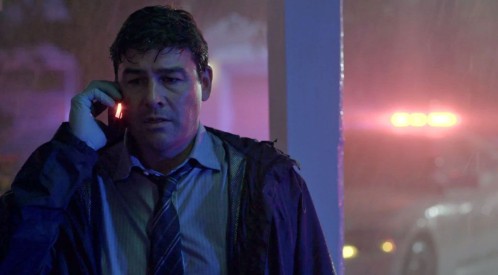
Bloodline (2015). Created by Glenn Kessler, Todd A. Kessler, Daniel Zelman
Entertainment, as an idea, is the child of a well developed society of domination. For it is not the pleasure of true escape (the irony is to call entertainment ‘escapism’, when it is nothing of the sort). Mass culture today on the most widely distributed level is one of infantile non-story and titillation. But the prestige product, that aimed at the educated 20%, is one of voyeurism and positionless solipsistic self validation. Everything from Marina Abramovic to Tilda Swinton sleeping in her bed, to all the endless gimmicks of young MFA grads is actually a rejection of journey, a rejection that is passed off as autopsy. The post modern moment in fine arts is one of desperation, in a sense. The desperation to convince themselves and their audience of their daring and originality. Creating new banality is not an achievement. It was interesting to read Hyperallergic this week where in a single issue one had to endure the self promotions of Molly Crabapple, and the idiotic art wars happening at MOMA, while then listening to a quite fascinating podcast conducted by Tyler Green and featuring Michelle White, the curator of a new show of the unfinished last paintings of Barnett Newman. Going to see just the reproductions of this work is quite breathtaking. Now, Newman is someone who the average disinterested viewer, unfamiliar with modern art, or any art, might shrug and snark a bit about the absurdity of contemporary art. And that fact returns me to the question of how to cultivate a vocabulary and a sensitivity to great but less than obvious artworks.
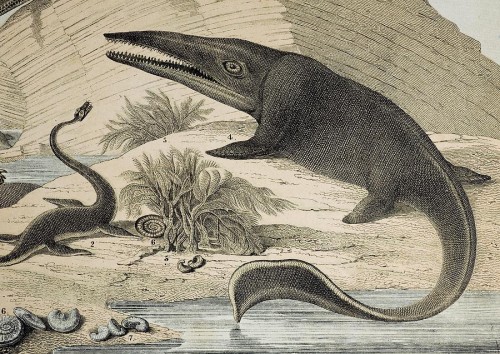
Benjamin Waterhouse Hawkins.
But before going on about that, I want to return to the woman in the car and the highway patrolman. Here is a quote from a very good piece by Andreas Malm, who teaches at Sweden’s Lund University..(published at Jacobin, and credit where credit is due)………..
“While it is admittedly banal to point out, steam engines were not adopted by some natural-born deputies of the human species. The choice of a prime mover in commodity production could not possibly have been the prerogative of that species, since it presupposed, for a start, the institution of wage labor. It was the owners of the means of production who installed the novel prime mover. A tiny minority even in Britain — all-male, all-white — this class of people comprised an infinitesimal fraction of humanity in the early nineteenth century.
Second, when British imperialists penetrated into northern India around the same time, they stumbled on coal seams that were, to their great amazement, already known to the natives — indeed, the Indians had the basic knowledge of how to dig, burn, and generate heat from coal. And yet they cared nothing for the fuel.
The British, on the other hand, desperately wanted the coal out of the ground — to propel the steamboats by which they transported the treasure and raw materials extracted from the Indian peasants towards the metropolis, and their own surplus of cotton goods towards the inland markets.”

Parviz Tanavoli
I have written before on how Hollywood cultural product is reliant on ratings, investor demands, and on sponsors. A great show that gets bad ratings is yanked. This results in a constant interruption of narrative. Couple that to the unfinished nature of infrastructure today, the ways many projects remains incomplete, and there is a training for people to anticipate interruption and incompletion. The Malm quote above speaks to this in the universalizing morality of a whole slew of very trendy and media friendly *thinkers*, Pinker, Gray, Searle, and others. Anyone who is not a Marxist, essentially. What is interesting is the ways in which this folded in psyche of today imposes its trivializing sense of narrative on their own projects. One encounters various organizing around saving this or that wetland, this or that nature preserve, this or that anything. But such timid reforms, most of which achieve nothing anyway, are no addressing the radical nature of what would be required to preserve some biodiversity. Today, the ruling class has instilled in their model of reform, token reform, such things as recycling your plastic bottles, for example. They wont do the work, YOU do the work. You separate the bottles, and carry them, in your gas burning auto, to the dump and deposit them there. Now, OK, fine, but how is it that this is an issue when the military of the U.S. and NATO pollute ten, no, a hundred, a thousand times more than the public? The military is not recycling. This goes back in a sense to the inability to think outside the mental commons which have been closed off.
The inability to want or desire the expansive is connected to the second tier anal sadism of ever greater numbers of people in the West. The petty mean spirited snitch, the busy body, the liberal social engineer — all excuses are always for your own good. But the point here is that this very pinched emotional palate is connected to the repressed rage at having to trot after the wealthy and powerful and begging for crumbs. The schizoid aspect of both loving and hating the ruling class. As the system falls apart, as the environment inches close to the catastrophic, the horizon of wars over water and food seem inevitable…and yet, the over all population has no tools intellectually, psychically, to mould those facts into a narrative that they can work from. The environmental movement has no narrative. It has small fragments of story, perhaps, slogans, but it falls prey to the simple minded mechanisms (grammatical often, only) of new age ersatz spirituality.

Lisa Oppenheim, photography. (long exposure).
It is probably worth looking at both how children, especially younger children, are educated, and socialized today, but also how they are conceived of conceptually. Rob Weatherill points out that during the middle ages all education was apprenticeship, but that often, if not usually, children were hired out to other families as servants, or businesses as labor or to learn a trade. Social education was passed down as community knowledge in the form of etiquette and manners and presentation. By the mid, or later 16th century century this was changing and attending school was accepted, and in all of this there was a profound class mediation. And this is worth pondering, I think. For the aristocracy there were social conventions geared toward preparation for rule and privilege. Boys were being groomed to be business and political leaders. Girls to be the good and graceful wives of business and political leaders. For the rest of society there was a shift toward mandatory public schooling, which was largely to facilitate control and monitoring of the unreliable masses. But what occurred following the industrial revolution was a turning inward on the part of families. A preoccupation, it seems to me, with one’s own children. The bourgeoisie looking wanted paintings to commemorate their excellence, and they wanted children to do the same thing. Children became property of their parents in a sense they were not previously. The image of these children, anyway, became an image that reflected the good taste and quality of their parents. The very idea of a parent, as its understood today, did not exist until the middle 1700s I don’t think. I suspect, by the 20th century, that what stimulated ideas of *how to better and responsibly raise your child* was a new niche market of women readers of magazines, with some purchasing power. Women were being sold the idea of being responsible parents. In fact I have the feeling that word, *responsible*, which is the most abusive word in the English language, has driven a lot of marketing, and vice versa. Guilt and responsibility.
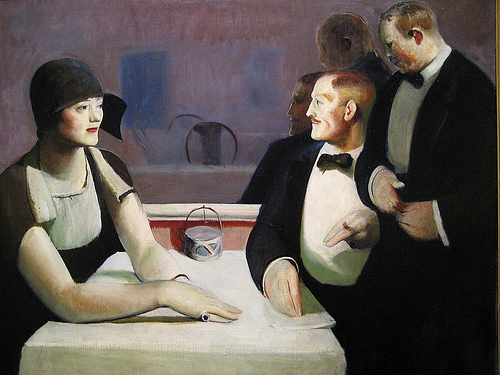
Guy Pene du Bois
In any event, this is the place where Freud and Reich enter the discussion. And patriarchy. Because the Oedipal drama, however one wants to spin it, or interpret it, I believe has at its core a basic truth. And this dynamic of authoritarian patriarchal family repression of instinctual desire, produced seriously fucked up children. That is us. For Reich he linked this stoppage of erotic energy to the orgasm. But it is really, I think, linked to the metaphoric orgasm as well. The allegorical orgasm.
The problem though is that in a society of domination, in which daily wage slavery is the norm, and in which the defense mechanisms of adults, to keep from outright psychosis, were shutting down in a sense, the better not to have to confront the acute contradictions of life in the Spectacle, the mandate for better parenting only elicited acute anxiety. Simple impulses of resistance were repressed. And narratives that validated conformity and service to authority were embraced. Ambivalence and uncertainty (unscientific) were avoided. Additionally, the society of advanced marketing and commodification had encouraged adults to resist maturation. Children were being raised by bigger children. This strange closed loop of narcissism has resulted, I think, in a further narrowing of experience. And a further abridging of narratives. Stories, fiction, today is increasingly reductive, and art itself is both commodity and leisure time tool. The idea of artworks, narratives especially, as radical interrogations of life has been mostly abolished. I continue to feel the absence of the allegorical in artworks. And without that desire for a transcendent unknown and to engage in a dream life that is uncertain and unpredictable the cultural commodity is there only to pass the time. Children now are increasingly distant from the work life of their parents. And that means from the work life of any adults. The identification children once formed with adults, as a way to process the world around them, and as a way to narrate to themselves their own story of growing-up, has been replaced with screen depictions of a fantasy world. Imagine a child watching and learning from today’s Hollywood TV and film. What sort of person does this child become?
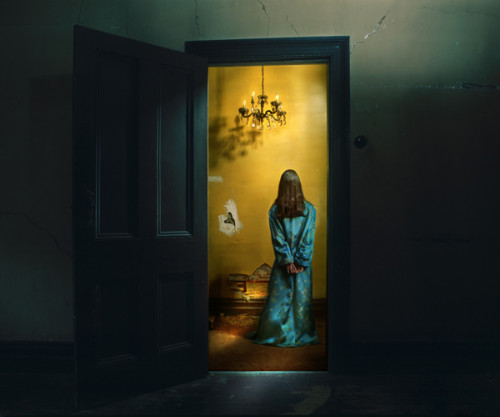
Samantha Everton, photography.
But there are contradictions in this; for if the child of the modern family (in the West anyway) was both cut off from community, from participation in apprenticeship, and correspondingly was more isolated, more private, then the role of the parents was heightened. And the parents were increasingly anxious and in retreat themselves from any genuine autonomy and experience of freedom. Rob Weatherill writes…
“As the status of children changed and their basic human needs for health, nutrition, and parental attention and concern were at least recognized, there may have been a corresponding increase in the harshness of the super-ego.”
All of this, at least partly, coincides with the needs of Capitalism. The society of regulation, domination, and conformity — of compliant workers, was inline with industrial capitalism. It is worth reading Freud on the ‘anal character’ at this point. For the creation of a clean and submissive child fit perfectly with both Puritanism (all Christianity) and Capital.
“On the shadow side of this personality {anal character} are more sinister traits which are always in danger of breaking through. The hidden defiance against the mother issues in a stubbornness and refusal to co-operate. The child was taught to deliver the feces but retains a secret desire to withhold them. This leads in later development to a tendency to hoard property.”
Rob Weatherill
Today, the rise of a pseudo science, influenced by behaviorism and corporate pharmaceutical interests, results in chemical treatment of children for exhibiting the most natural emotions and behavior. The goal is the well behaved android child. However, this is taking place under the aegis of *freedom* for the child. The child must mentally navigate the contradictions of a society of unfreedom and of no privacy in the form of mass surveillance, with an ideological backdrop that teaches the value of personal individual freedom. The missing element of course is the connection with community, with adult society, and the intimacy with grown up work.
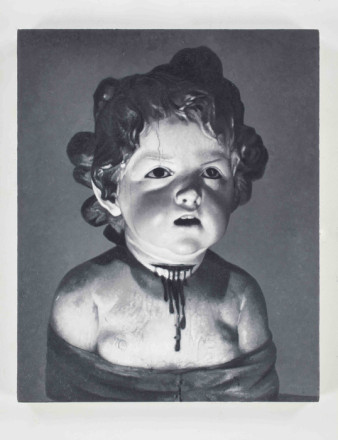
Rudolph Stingel (detail)
These contradictions are mirrored in strange ways by the evolution of the U.S. and imperialist foreign policy. Contradictions applied to, say the overthrow of colonial occupation in many countries throughout the world where the newly independent state was only to be recolonized by the West under and through different means. The treatment of the less powerful as children in need of proper toilet training. The paternalism of the white state. And so in artworks and culture.
“In our society amusements — socialized substitute satisfactions — are mass produced by the media, and distributed as though they are manna necessary for life in the emotional desert the society itself has created. We have achieved a more sophisticated system of manipulating irrationality so that destructive revolution will not break out.”
Donald Kuspit
The narratives of mass culture today are often ambitious, in a genuine sort of way. But they fail to express anything beyond the workings of daily life of studio executives. Worse, the audience that is able to discern the hollow interior of these narratives has all but disappeared. The Neflix produced mini-series Bloodline was in many ways an exemplary project. An expanded narrative with tragic intentions, featuring a number of outstanding actors (in particular Ben Mendolsohn). But it was almost a prospectus for a narrative rather than a real narrative. The idea of creating a family haunted by the death of a child, especially the siblings who were partly responsible, would or should be material for a dark fatalistic examination of the modern family. Instead there is a curiously bloodless (sic) meandering story with a caricature version of an O’Neil or Williams family, and one that squanders a terrific atmospheric locale in the Florida keys. For some reason I thought of Munch’s painting “Evening on Karl Johan Strasse”. It is my favorite of Munch’s paintings, and it is a visionary prophetic glimpse at the interior terrors of alienated society. That is what I wanted in Bloodline. And it is curious that if one steps back to just listen to the writing, on a line by line basis, what you can hear is a severely constricted vocabulary. It is colorless, bland, anodyne.
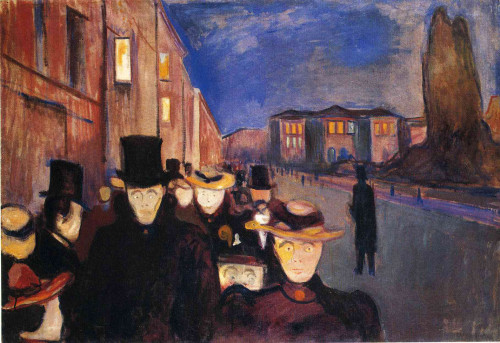
Edvard Munch. “Evening on Karl Johan Strasse”. 1892.
It is the teleplay of men who, one guesses, rarely leave the office. There is nothing regional, nothing specific, nothing that one remembers. The horror of the child’s death remains opaque somehow. The audience is told it has scarred everyone, but this is never felt. Now, perhaps I am being unfair on one level to compare it to Munch, and the subject matter is not exactly the same anyway, but one irony is that Sam Shepard is cast as the patriarch (for the 800th time I think) and wanders through the film as if thinking of other things…but the irony being that he is the author of one of the best modern plays on family and child mortality in Buried Child.
There is a voice-over in Bloodline, and perhaps it is in the writing of that voice that one can most clearly hear the lack of vivid imagery — the lack of catching the sound of *a* voice. Its generic, and it’s a shame because the opportunity was there.
So, back to that woman in the car in the rain and the highway patrolman. The erosion of the paternal authority of family by a newer tyrannical and sadistic super-ego (a surplus super ego?) has accounted for a generation, or two, who have grown up with a particular vulnerability (or attraction) to extreme fascist thinking and imagery. The manipulations of marketing have been inserted into interior narratives replacing the old sound of the authoritarian father. But at least that old patriarch existed in the world, was a conduit to other adults and to social customs and rituals. One of the problems with this dynamic, structurally, is that marketing *is* manipulation, its coercion by stealth, and trickery. It is authoritarianism without any of the mediating actions of honor and loyalty. It exists outside history. The new super ego is ruthless and cynical. So, we have this nasty and ill educated inner cop, who nonetheless keeps a lid on the force of recognition that is always pushing up from the semi-conscious; a recognition of the trickery, of the fact that everyone is a Stepford Wife, or a pod person. The sense expressed by many (Ive quoted David Foster Wallace on this, before) is that of a quiet panic in the young. A sense of things simply not being comprehensible, or controllable. The sense of the state, of the organized uniformed guidance of punitive power is easily surrendered to and, additionally there is an acute sense of guilt running through Western society today. I have said before that the first Terminator film marked a watershed in the collective psyche of the U.S. A robot, or android, was a better parent than any human. A killer warrior android. And one who doesn’t defecate. The demand that the child be clean, and parsimonious is a very early link that is later mediated by fears of castration (Oedipal narrative). But the new psyche of the West is one in which the capacity to feel outrage at the patrolman’s abuse seems now to have died. Outrage at mall cops asking to look in your bag, gone. For there is no narrative that reaches beyond the merely obedient, the neurotic concerns of adjustment, the shallow narcissism of a construction of self that convinces itself of its own contentment. Identification is now with the aggressor.
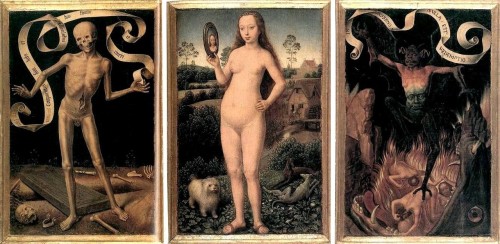
Hans Memling, “Earthly Vanity & Divine Salvation”. 1492
The age of mass surveillance has also altered the interior landscape in the sense that being watched accelerates the sense of performance, of performing the role of self. But it is a performance now tied to fear and guilt. Or rather it is tied to a new super guilt, a constant subject position that must constantly be on guard; that it is always and has always been guilty. The narratives that one once told oneself to make sense of the universe have retreated to simple stories of self protection. To escape being found out. To escape discovery. And that anxiety is projected outward to find guilt in everyone else, the better to avoid detection of oneself.
But discovered by whom? The fear is of the *other*, of a shadow that lurks behind the phenomenal. I often wonder when looking back at photographs from the late 1800s on through to say the first world war, of city streets, or country roads, in Europe or the U.S. There are often very small towns, isolated to some degree, and where there are crowds, they are relatively small. The presence of the farmer still loomed large in the collective consciousness of people. Agriculture was a culture, and almost everyone knew someone or was related to someone, who farmed. Anyone not in a large city did some farming. You grew your own food to some degree. But rural meant farms. There were vegetable farms, orchards, berry farms, and there were bee keepers and dairy farms. The people who worked or owned these farms were usually descended from farmers. People spent a lot of time working, but also in dealing with work related culture. For most kinds of work had cultures around them. Festivals and fairs, livestock shows, or even just traveling carnies. They were pegged to the culture usually. Even city people worked hard.
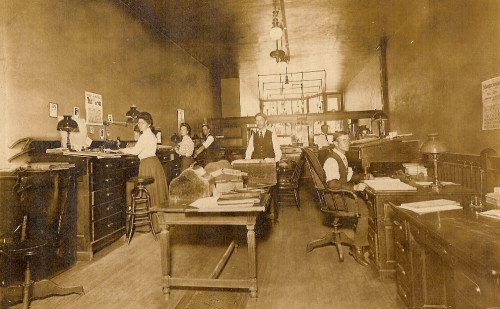
Traction Light, Heat & Power, Appleton Wisconsin. 1908
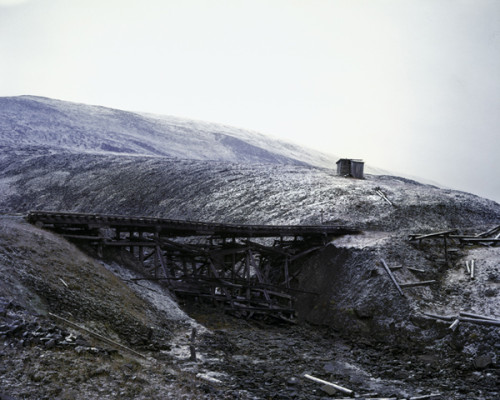
Ville Lenkkari, photography.
This has been written about as far back as WW1, but the most significant book was David Riesman’s The Lonely Crowd, written in 1950. This was a popular psychology overview of shifting interior maps. The tradition based culture had, in the Industrial Revolution, started to morph into what Riseman called *inner directed* which in turn became mid century the *other directed*. All of this is true enough, though the issue was what *other directed* actually meant. It is also wildly simplistic. Still, it was a hugely influential book. The question is, how this *other directed* individual negotiates the *other* that is essentially ephemeral. The other directed where there is no Other. For the implications, even by Riesman, was that consumerism was the *other*. The great narratives of the late 19th century; from Tolstoy to Melville to Conrad and Dostoyevsky gave way to Kafka and Herman Broch and Robert Musil. And they in turn to Bernhard and Sebald. But we continue to live in the shadow of Kafka, I think. The woman approached by that highway patrolman is the species of *other directed mass consumer*, disciplined to fear and worship authority, submitting to a ruthless unspairing super-ego, and that warehouses vast amounts of disconnected information, propaganda, and who is on a psychic treadmill of self definition that changes hourly. And who feels guilt regardless of the guilt being real.
Today, if you ask any teacher in the U.S., they will tell you that more and more students are arriving at school with behavioral problems, and emotional problems. There are higher percentages of students with *learning disabilities*. I suspect that these definitions are leaving out the *teaching disabilities* involved, but never mind. The post modern psyche, if we choose that term, is reflected in mass cultural narrative. These are narratives without a point of reference. They exist with an only generalized history as backdrop, and emotionally are defensive and fearful of the more pronounced backdrop of punishment and violence. Language has become ever more denuded and without poetics, and the stories it is employed to tell are ever more closed off from memory. There is no allegory, and no sense of spiritual journey. The voices of the working class are erased, because they represent a threat, but increasingly everyone is subsumed in this meta-instability and manipulation.

Police Abuse of Uber Driver in New York City – March 30th, 2015: https://youtu.be/SGSrGmHsT8s
Great stuff. This sadism is really getting out if control…the same Authoritarian Personality but with this new aspect that you discuss, the distancing, this passive spectator stance. I’m just increasingly horrified. People really lack any sense of plausibility and any capacity to synthesize data to firm understanding. Dementia indeed. And repressed terror/horror. The petty bourgeoisie,are all kapos + wannabe kapos. As you say, lost the memory of resistance. Yet the ruling class hangs on by a thread to power. it’s not legitimacy consented to but another coerced acquiescence that is their invulnerability. The mass of psychtropic drugged brains ….they are now the norm, affecting the rest who aren’t because its, these, drugged brains, we must deal with: the society is drugged, the whole network. Why do people question whether propaganda is “necessary”?
yeah, its that lack of synthesizing…..a great word for it. The inability to engage with complexity in narrative….well, with the world, takes the form in a sense of not synthesizing these disparate ideas or images. Its the lack of a reference point.
memory of resistance. Yes.
And the endless coercion.
Your example of the lady driver’s treatment by the policeman contains several pointed insights which reveals the “creep” of our “inverted authoritarianism.” Such
actions both dehumanize and gain acceptance at the same time, joining a gathering
array of restrictions on individual freedom and integrity. Many people seem to have
happily traded such freedom and integrity for an empty popularity on “social” media.
The price of such transactions is heavy indeed. In my teaching days, I and my
students read, studied and discussed the great writings of our heritage, from
Homer and Sophocles to the twentieth century writers like Boll, Mann, Musil, Beckett,
Jeffers, Eliot, and on and on. The list seemed endless, as did the genius and imagination and struggle recorded in these treasures. Yet, how quickly and how
readily we have discarded and discredited them until now venture capitalists
are converting a Liberal Education into business profits and small minds. When I
speak with my generation members of this, we all agree the opportunities for work
of fulfillment and love have all but disappeared.
Thoreau saw the future long ago and realized the fast track the train takes leads
to a steady diminishing of our humanity, so he decided to follow his own, thereby
making a new and wonderful track, not for others to follow, but to be inspired to
go against the grain Thus, he declared he “would not have his eyes put out and his
ears stopped up” by the smoke and noise of technology. I think our collective will
has been neutered by the selling of ease and disease, and like Mann’s wonderful
story, “Mario and the Magician”, the human will cannot flourish by merely “willing
against.” Freedom cries for release. Perhaps that is one of the things we learn
from animals — provided we will cease to slaughter them into oblivion. I will sign off
with a short poem in which I have attempted to catch this situation in another
form. I value your writings deeply; they provide an intellectual strength amid our great turmoil and confusion.
CAME THE HORSES
Gliding down the road so soothingly, humming along,
As the rolling land flashes by, the road ahead
Ribbons on into a pointed distance, the viewer
And its object, the tinted glass in between.
Then, suddenly, a hill falls over into a deep, long glen
Where fifteen or so horses of all makes and colors
Are galloping, cavorting and skimming over the green,
A couple kicking their heels as the huge lead roan,
Nostrils flaring, head held high, and mane flying,
Striding, Oh, striding! More beautiful and graceful
Than life itself.
A sudden rigor of needle points invades the torso,
Accompanied by a burning watering of the eyes
Fighting tears away, the head turns, gazing wistfully
At the disappearing scene, movement gone, lines
In motion dissolving, part of the heart torn out,
Bleeding an all too brief memory, sitting, quaking,
Spent as after lengthy love-making and earth-shaking organism.
Whence came such a riot and gamut of emotion?
what was the speed, beauty, form in movement and
Power of those creatures to this pale existence?
from MOVING IN DARKNESS (2014)
I’ve always wondered what effect countless security cameras have on people, subliminally. Wave theory experiments have determined that observation changes the behaviour of light particles. How about human tissue? Brain matter? http://en.wikipedia.org/wiki/Wave%E2%80%93particle_duality
@kevin:
I wonder that, too. I think there are several layers of meaning going on with such massive surveillance in public spaces, and I suppose in private spaces too. Ive honestly thought for a long while that even being photographed a lot, over time….celebrities or film stars…….doesnt erode something in the face. Aging actors….and yeah sure, botox , plastic surgery, etc is a part of it….but its more than that. It starts to do something almost metaphysical I think.
Surveillance though is altering how people move, altering gestures etc. There is no question about that I dont think. The normalizing of this paranoia…..it becomes incorporated in people’s bodies.
@charles;
the loss of this impulse to question. Its a loss of curiosity, but of a sense of justification of ourselves; people have forgotten that they have the right to exist.
Narrative. Where to start?
I came to the US in 1963, at the age of nine, from Bucharest, via Paris. The earliest traumatic experience I can recall in the US is that of watching a movie on TV, which was interrupted by a commercial. Now, this is so normal, now that people have never understood my incredulity and outrage at this practice. There was a claim made that the needs of the advertiser were greater than my needs for artistic unity. I did not believe that could be possible. I still don’t.
But I understood then, that if people claim the right to interrupt and take over your aesthetic enjoyment of a work of art, they can do anything. Anything.
So, yeah. Narrative.
glad you said that. Because it IS traumatic. Its basic.